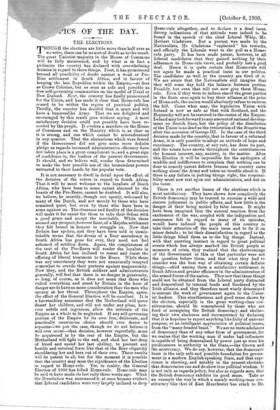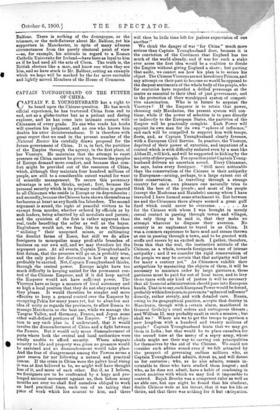ICS • OF THE DAY.
THE ELECTIONS.
THOUGH the elections are little more than half over as we write, there can be no sort of doubt as to the result. The great Unionist majority in the Rouse of Commons will be fully maintained, and by what is in filet a plebiscite the country has declared with overwhelming decision in regard to three things. First, it has pronounced beyond all possibility of doubt against a weak or Pro- Boer settlement in South Africa, and in favour of keeping the late Republics within the Empire,—at first as Crown Colonies, but as soon as safe and possible as free self-governing communities on the model of Natal or New Zealand. Next, the country has finally pronounced for the Union, and has made it clear that Home-rule has ceased to be within the region of practical politics. Thirdly, the country has decided that it must and will have a businesslike Army. That we are delighted and encouraged by this result goes without saying. A more satisfactory decision could not possibly have been re- corded by the people. It confers a mandate on the House of Commons and on the Ministry which is as clear as it is strong, and one which cannot be misunderstood in any quarter. That the abstentions which were feared if the Government did not give some more definite pledge as regards increased administrative efficiency have not taken place is a great compliment to, and a great sign Of confidence in, the leaders of the present Government. It should, and we believe will, render them determined to make the best possible use of the tremendous powers entrusted to their hands by the popular vote.
It is not necessary to dwell in detail upon the effect of the decision of the voters in regard to South Africa. That it will be most welcome to the loyalists of South Africa, who have been to some extent alarmed by the boasts of the Pro-Boers, cannot be doubted. It will also, we believe, be secretly, though not openly, welcomed by many of the Dutch, and not merely by those who have remained quiet, but even by those who have been in arms against us. The clearness and finality of the decision will make it far easier for them to take their defeat with a good grace and accept the inevitable. While there seemed any prospect, however faint, of a Majuba settlement they felt bound in honour to struggle on. Now that Britain has spoken, and they have been told in unmis- takable terms that the dream of a Boer ascendency in South Africa has gone for ever, they need not feel ashamed of settling down. Again, the completeness of the rout of the Pro-Boers will render the loyalists in South Africa far less inclined to resent and resist the offering of liberal treatment to the Boers. While there was any uncertainty they were not unnaturally tempted somewhat to overdo their protests against magnanimity. Now they, and the British soldiers and administrators generally, will feel that there is no danger in generosity, so long, of course, as it does not mean that those who risked everything and stood by Britain in the. hour of danger are to have no more consideration than the men who sprang at her throat. Throughout the Empire, again, the effect of the General Election will be excellent. It is a far-reaching assurance that the Motherland will never desert her children, and will not under any pleas, how- ever subtle and ingenious, allow the interests of the Empire as a whole to be neglected. If any self-governing portion of the Empire by its own free, deliberate, and practically unanimous choice should ever desire to separate—we put the case, though we do not believe it will ever occur—that decision, however regretfully, must be acquiesced in by the rest of the Empire, but the Motherland will fight to the end, and shed her last drop of blood and spend her last shilling, to prevent any hostile and external force like that of the Boer oligarchy shouldering her and hers out of their own. These results will be patent to all, but for the moment it is possible that the country may miss the significance of.the Election in regard to Home-rule. Yet, in reality, the General Election of 1900 has killed Home-rule. Rome-rule may be said to have made its last rally three weeks ago. When the Dissolution was announced it at once became evident that Liberal candidates were very largely inclined to drop Home-rule altogether,., and to declare it a dead issue. Strong indications of that attitude were indeed to be found in the speech of the chief Liberal -Whip, Mr. Herbert Gladstone. But a. protest was made by the Nationalists, Mr. Gladstone "explained." his remarks, and officially the Liberals went to the poll as a Home- rule party. It has been made patent, however to all Liberal candidates that they gained nothing by their adherence to Home-rule views, and probably lost a good deal. Hence it is quite certain that Home-rule will not again be made a practical issue in our politics. The candidates as well as the country are tired of it. We are aware that the Nationalists still imagine that they will some day hold the balance between parties. Possibly, but even that will not now give them Home. rule. Even if they were to induce oneof the great parties in the State once again to buy their alliance at the price of Home-rule, the nation would absolutely refuse to endorse the bill. Come what may, the legislative Union with Ireland is now as safe as that with Scotland, and the Heptarchy will not be restored in the centre of the Empire. Ireland may look forward to any amountof national develop- ment on Scotch lines, but the policy of the dissolution of the Union is as dead as the restoration of the Stuarts was after the accession of George III. In the case of the third. decision made by the country, that in favour of a reformed Army, it is only possible to adopt an attitude of hope and expectancy. The country, at any rate, has done its part, and the voters have shown throughout the constituencies the keenest interest, nay, anxiety, in the matter. After this Election it will be impossible for the apologists of muddle and indifference to complain that nothing can be done to remedy patent defects because the country cares nothing about the Army and takes no trouble about it. If there is any failure in putting things right, the responsi- bility must now rest upon our administrators, and. not on the voter.
There is yet another lesson of the elections which is most satisfactory. They have shown how completely the British democracy may be trusted to exercise a wide and sincere judgment in public affairs, and. how little is the danger of their being misled by false issues. It might have been imagined that the natural reaction from the excitement of the war, coupled. with the indignation and annoyance felt in regard to many of its episodes, would have induced the people of this country to take their attention off the main issue and to fix it on minor details ; to let their dissatisfaction in regard to the little things blind them as to the big things. Instead, with that unerring instinct in regard to great political events which has always marked the British people at moments of crisis, they realised that the shortcomings of the Government in this or that particular were not the question before them, and that what they had to consider was the best way of obtaining certain definite things,—chief among them a satisfactory settlement in South Africa and. greater efficiency in the administration of the armed forces of the nation. They saw that these things could not be obtained from the Liberal 'party distracted and demoralised by internal feuds and burdened. by the Irish alliance, and. they therefore most wisely determined to entrust the work of government again to the Union- ist leaders. This steadfastness and good sense shown by the electors, especially in the great working-class con- stituencies, should be remembered by those who are fond of arraigning the British democracy, and shelter- ing their own slackness and incompetency by declaring that it is hopeless to expect anything like fixity of national purpose, or an intelligent, appreciation of political issues, from the "many-headed beast." We are no more adulators of democracy than of any other form of government, for we realise that the working man if under bad influences is capable of being demoralised by power just as were his predecessors in authority in the State,—the Crown and the aristocracy. We do say, however, that the democratic basis is the only safe and possible foundation for govern- ment in a modern English-speaking State, and that expe- rience is showing, and notably in the present- elections, that democracies can and do show true political wisdom. It is not only as regards policy, but also as regards men, that the British democracy exhibits its good sense. Take as an example the way in which a mainly working-man con- stituency like that of east Manchester has stuck to Mr. Balfour. There is nothing of the demagogue, Or the trimmer, or the mob-flatterer about Mr. Balfour, yet his supporters in Manchester, in spite of many adverse circumstances from the purely electoral point of view —as, for example, his attitude in regard to a Roman Catholic University for Ireland---have been as loyal to him as if he had used all the arts of Cleon. The truth is, the British electors like a man, and know one when they see him, and so have stuck to Mr. Balfour, setting an example which we hope will be marked by the far more excitable and lightly moved Members of the House of Commons.



















































 Previous page
Previous page